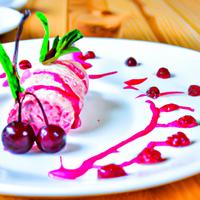
1 serving (150 grams) contains 200 calories, 2.0 grams of protein, 5.0 grams of fat, and 40.0 grams of carbohydrates.

Log this food in SnapCalorie

Nutrition Information
Calories |
315.5 | ||
|---|---|---|---|
% Daily Value* |
|||
| Total Fat | 7.9 g | 10% | |
| Saturated Fat | 4.7 g | 23% | |
| Polyunsaturated Fat | 0 g | ||
| Cholesterol | 0 mg | 0% | |
| Sodium | 15.8 mg | 0% | |
| Total Carbohydrates | 63.1 g | 22% | |
| Dietary Fiber | 3.2 g | 11% | |
| Sugars | 55.2 g | ||
| protein | 3.2 g | 6% | |
| Vitamin D | 0 mcg | 0% | |
| Calcium | 31.5 mg | 2% | |
| Iron | 0.8 mg | 4% | |
| Potassium | 236.6 mg | 5% | |
* Percent Daily Values are based on a 2,000 calorie diet. Your daily values may be higher or lower depending on your calorie needs.
Food Attributes
Source of Calories
About Cherry jubilee
Cherry Jubilee is a classic dessert made by cooking dark sweet cherries in a sauce of sugar, cherry liqueur, and sometimes lemon juice, which is then flambéed for dramatic effect. Typically served warm over vanilla ice cream, this dish has roots in French cuisine, created in honor of Queen Victoria's jubilee. Cherries, the star ingredient, are packed with antioxidants, vitamins A and C, and fiber, offering anti-inflammatory properties and potential heart health benefits. However, the added sugar and liqueur boost the calorie and alcohol content, making this indulgent dish best enjoyed in moderation. While Cherry Jubilee offers a delightful way to showcase seasonal cherries, mindful preparation—like reducing added sugar or opting for lighter accompaniments—can make it a more balanced treat. Whether as a centerpiece dessert or a special culinary experience, it combines natural fruit goodness with a touch of luxurious sweetness.



